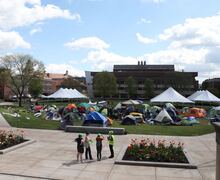Symposium to discuss disabilities, address stigma
William J. Peace’s battles with neurological deficiencies sent him in and out of hospitals for most of his youth until he was 18 years old, when he became paralyzed. He never expected to reach his 21st birthday.
Peace’s father told him that he needed to live his life fully despite the limits of a wheelchair.
“My parents held me to the exact same standards as my siblings — best thing that could have happened to me,” he said.
Peace will address the social stigma of living with disability on Friday when he hosts the Watson Symposium entitled, “Lives Worth Living” in the Schine Student Center room 304. The event will start at 9 a.m. and run until 5 p.m. The symposium is part of Peace’s duties as the 2014 Jeannette K. Watson Distinguished Visiting Professor.
As many as 100 people throughout the course of the day are likely to attend the event, said Eric Holzwarth, deputy director of the Renée Crown University Honors Program. Peace’s symposium will focus on disabilities, bioethics and contemporary medicine. Peace’s lecture is entitled “Bioethics, Disability and Lives Worth Living.”
As someone who has lived with paralysis for years, Peace said that he has experienced its social stigma firsthand.
“It’s day in and day out, it’s death by a thousand social cuts,” he said. “It’s just a revolutionary style of wearing down and it takes steel will to just sometimes, literally just walk out your door, because you know you’re going to have a negative social experience.”
Stephen Kuusisto, director of the honors program, said the professorship is one of the initiatives supported by the Tolley Humanities Center. The professor comes to Syracuse University for 10 days in the spring semester and delivers a lecture, visits classrooms and is available for scholars and students in their area of expertise.
Previous hosts of the Watson Symposium include humanities scholars like Nobel Prize and Pulitzer Prize winner Toni Morrison. Karen Ortega, program coordinator of the Tolley Humanities Center, said the position is held every spring semester and is based on submitted proposals by faculty and departments on campus.
In addition to Peace’s lecture, there will also be lectures by Brenda Brueggemann, professor of English and director of composition at the University of Louisville; Barbara Farlow, a researcher and writer on bioethics, and Pulitzer Prize-winning journalist Sheri Fink.
Holzwarth said he hopes that the lecture from Fink to close the symposium will help increase turnout. Fink’s closing keynote presentation will include a reading from her book “Five Days at Memorial: Life and Death in a Storm-Ravaged Hospital,” a book that details the events at Memorial Medical Center after Hurricane Katrina and the euthanasia that happened there.
“Who gets saved first during a disaster is a question of values as much as medicine, and I’d like attendees to understand more about how disability plays into these decisions,” Fink said in an email.
In addition to the Watson Symposium and his academic work, Peace runs a blog known as “Bad Cripple” and uses this platform to reach out to others. He hopes the symposium will expand his connection with the disabled community.
Said Peace: “It’s part of what I sense as a moral obligation — to reach other people with disability who don’t have the advantages I have.”
Published on April 2, 2014 at 11:56 pm
Contact Rob: [email protected]




